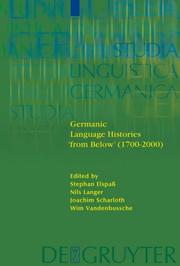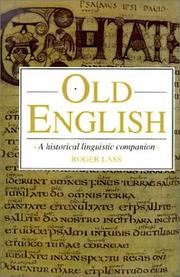| Listing 1 - 6 of 6 |
Sort by
|
Book
Year: 2009 Publisher: Paris : Institut d'études slaves,
Abstract | Keywords | Export | Availability | Bookmark
 Loading...
Loading...Choose an application
- Reference Manager
- EndNote
- RefWorks (Direct export to RefWorks)
Historische Grammatik. --- Polish language --- Polnisch. --- Grammar, Historical. --- Historical grammar.
Book
ISBN: 1108298060 1108299660 1108299989 1108300308 1107534933 1316335186 1108300626 1108301908 1107114292 1108301584 9781316335185 9781107114296 9781107534933 Year: 2017 Publisher: Cambridge : Cambridge University Press,
Abstract | Keywords | Export | Availability | Bookmark
 Loading...
Loading...Choose an application
- Reference Manager
- EndNote
- RefWorks (Direct export to RefWorks)
Informed by detailed analysis of data from large-scale diachronic corpora, this book is a comprehensive account of changes to the expression of negation in English. Its methodological approach brings together up-to-date techniques from corpus linguistics and minimalist syntactic analysis to identify and characterise a series of interrelated changes affecting negation during the period 800-1700. Phillip Wallage uses cutting-edge statistical techniques and large-scale corpora to model changes in English negation over a period of nine hundred years. These models provide crucial empirical evidence which reveals the specific processes of syntactic and functional change affecting early English negation, and identifies diachronic relationships between these processes.
English language --- Linguistic change. --- Historical grammar. --- Change, Linguistic --- Language change --- Historical linguistics --- Language and languages --- Negatives. --- Grammar. --- Variation. --- Dialects --- Germanic languages --- Linguistic change --- Historical grammar --- Negatives --- Grammar --- Variation
Book
ISBN: 3110784289 3110784181 Year: 2023 Publisher: Berlin ; Boston : De Gruyter,
Abstract | Keywords | Export | Availability | Bookmark
 Loading...
Loading...Choose an application
- Reference Manager
- EndNote
- RefWorks (Direct export to RefWorks)
In order to counteract introspective approaches and the detailed analysis of individual cases in historical grammar research, this volume brings together essays by experts working on the empirical analysis of (text)grammatical structures in Old German and Middle High German texts, also taking into account sociolinguistic parameters. These scholars have developed promising concepts and outline their projects here. Introspektive Zugänge und die Detailanalyse von Einzelfällen gehören in der historischen Grammatikforschung nach wie vor zu den gängigen Praktiken. Dieser Vorgehensweise kommt nicht von ungefähr: Eine umfassende empirische Analyse historischen Quellenmaterials ist aus mehreren Gründen schwierig, und selbst im Falle einer solchen sieht sich die sprachhistorische Disziplin prinzipiell immer noch mit den von Labov in Bezug auf den Sprachwandel formulierten Problemen hinsichtlich des historischen Paradoxons konfrontiert. Zudem sind bei der Analyse historischer Quellen weitere Hürden zu nehmen: Die Quelltexte sind nicht sehr zahlreich und durch externe Einflussfaktoren geprägt, was Rückschlüsse auf einen „tatsächlichen" Sprachgebrauch oder das Sprachsystem als Ganzes zusätzlich erschwert. Hinzu kommen Interpretationsprobleme, Zweifelsfälle und der oft implizite Vergleich mit dem Neuhochdeutschen. Trotzdem, oder gerade deshalb, sollte besonderes Augenmerk auf die Methodik der Analyse historischer Texte gelegt werden, und genau das hat die vorliegende Publikation zum Ziel: Vereint werden Aufsätze von Fachwissenschaftler*innen, die im Bereich der Germanistischen Sprachgeschichte an der empirischen Analyse grammatischer und textgrammatischer Strukturen, auch unter Berücksichtigung soziolinguistischer Parameter, in alt- und mittelhochdeutschen Texten arbeiten, vielversprechende Konzepte entwickelt haben und ihre Projekte skizzieren.

ISSN: 18615651 ISBN: 9783110193350 3110193353 311092546X 9783110925463 Year: 2007 Volume: 86 Publisher: Berlin: de Gruyter,
Abstract | Keywords | Export | Availability | Bookmark
 Loading...
Loading...Choose an application
- Reference Manager
- EndNote
- RefWorks (Direct export to RefWorks)
Focusing on the sociolinguistic history of Germanic languages, the current volume challenges the traditional teleological approach of language historiography. The 30 contributions present alternative histories of ten 'big' as well as 'small' Germanic languages and varieties in the last 300 years. Topics covered in this book include language variation and change and the politics of language contact and choice, seen against the background of standardization processes of written and oral text genres and from the viewpoint of larger sections of the population.
Germanic languages --- History --- Variation --- Standardization --- Political aspects --- History. --- Political aspects. --- Variation. --- Teutonic languages --- Indo-European languages --- Standardization&delete& --- Germanic languages - History --- Germanic languages - Variation --- Germanic languages - Standardization - History --- Germanic languages - Standardization - Political aspects --- Germanic languages. --- Historical Linguistics. --- Historical Sociolinguistics. --- Historical grammar. --- Social History. --- LINGUISTIQUE HISTORIQUE --- LANGAGE ET LANGUES --- SOCIOLINGUISTIQUE --- NORMALISATION --- PAYS DE LANGUES GERMANIQUES --- VARIATION --- ASPECT POLITIQUE --- Langues

ISBN: 0521430879 052145848X 1316039781 0511621000 9780521458481 9780511621000 9780521430876 Year: 1994 Publisher: Cambridge: Cambridge university press,
Abstract | Keywords | Export | Availability | Bookmark
 Loading...
Loading...Choose an application
- Reference Manager
- EndNote
- RefWorks (Direct export to RefWorks)
Old English is a companion to Old English studies and to historical studies of early English in general. It is also an introduction to Indo-European studies in the particular sense in which they underpin the history of English. Professor Roger Lass makes accessible in a linguistically up-to-date and readable form the Indo-European and Germanic background to Old English, as well as what can be reconstructed about the resulting state of Old English itself. His book is a bridge between the more elementary Old English grammars and the major philological grammars and recent interpretations of the Old English data.Old English assumes a basic knowledge of phonetics and phonology, the elements of syntactic and morphological theory, and an introduction to historical linguistics. An extensive glossary gives definitions of the major technical terms used.
Historical linguistics --- English language --- anno 500-1199 --- Anglais (Langue) --- Grammar, Historical --- Grammaire historique --- Langue anglaise --- --Ancien anglais --- --Grammaire --- --English language --- Grammar --- 802.0-022 --- Oudengels --- Grammar. --- 802.0-022 Oudengels --- Old English, ca. 450-1100 --- Grammar [Historical ] --- English language - Old English, ca. 450-1100 - Grammar, Historical. --- Grammar, Historical. --- Arts and Humanities --- Language & Linguistics --- Germanic languages --- Ancien anglais --- Grammaire --- English language - Old English, ca. 450-1100 - Grammar --- ENGLISH LANGUAGE --- OLD ENGLISH --- HISTORICAL GRAMMAR
Book
ISBN: 311040320X 3110403161 3110360489 9783110403176 311040317X 9783110360486 9783110403206 9783110403169 9783110360486 Year: 2015 Publisher: Berlin : De Gruyter,
Abstract | Keywords | Export | Availability | Bookmark
 Loading...
Loading...Choose an application
- Reference Manager
- EndNote
- RefWorks (Direct export to RefWorks)
A lot of what we know about “exotic languages” is owed to the linguistic activities of missionaries. They had the languages put into writing, described their grammar and lexicon, and worked towards a standardization, which often came with Eurocentric manipulation. Colonial missionary work as intellectual (religious) conquest formed part of the Europeans' political colonial rule, although it sometimes went against the specific objectives of the official administration. In most cases, it did not help to stop (or even reinforced) the displacement and discrimination of those languages, despite oftentimes providing their very first (sometimes remarkable, sometimes incorrect) descriptions. This volume presents exemplary studies on Catholic and Protestant missionary linguistics, in the framework of the respective colonial situation and policies under Spanish, German, or British rule. The contributions cover colonial contexts in Latin America, Africa, and Asia across the centuries. They demonstrate how missionaries dealing with linguistic analyses and descriptions cooperated with colonial institutions and how their linguistic knowledge contributed to European domination. Ein Großteil des Wissens über „exotische“ Sprachen verdanken wir den linguistischen Aktivitäten der Missionare. Ihr Beitrag belief sich v.a. auf die Verschriftlichung, die Beschreibung der Grammatik und Lexik sowie auf die Standardisierung, was in manchen Fällen mit einer eurozentristischen Manipulation der beschriebenen Sprachen einherging. Insgesamt war die koloniale Missionierung als geistige (religiöse) Eroberung Teil der politischen Kolonialherrschaft, auch wenn sie manchmal im Widerstreit zur Kolonialverwaltung stand. Die Verdrängung und Diskriminierung der Sprachen hat sie jedenfalls, trotz der meistens ersten, z.T. bewundernswerten, z.T. fehlerhaften Beschreibungen selten aufhalten können, bisweilen sogar daran mitgewirkt. Der Band bietet exemplarische Studien über katholische und protestantische Missionarslinguistik unter den Bedingungen der jeweils geltenden Kolonialpolitik unter spanischer, deutscher und britischer Verwaltung in Hispanoamerika, Afrika und Asien in verschiedenen Jahrhunderten. Sie zeigen, wie sprachbeschreibend tätige Missionare mit den Kolonialverwaltungen kooperierten und mit ihrem Wissen zur Herrschaft beitrugen.
Colonialism -- Congresses. --- Language and languages -- Study and teaching -- History -- Congresses. --- Missions -- Linguistic work -- Congresses. --- Language and languages --- Lexicography --- Grammar, Comparative and general --- Missions --- Indians --- Languages & Literatures --- Philology & Linguistics --- Study and teaching --- History --- Syntax --- Linguistic work --- Languages --- Aborigines, American --- American aborigines --- American Indians --- Amerindians --- Amerinds --- Pre-Columbian Indians --- Precolumbian Indians --- Ethnology --- Christian missions --- Christianity --- Missions, Foreign --- Religion --- Theology, Practical --- Proselytizing --- Comparative grammar --- Grammar --- Grammar, Philosophical --- Grammar, Universal --- Philosophical grammar --- Linguistics --- Philology --- Encyclopedias and dictionaries --- Foreign languages --- Anthropology --- Communication --- Information theory --- Meaning (Psychology) --- Civilization --- Grammar, Comparative --- Indigenous peoples --- Communication, International. --- Colonies --- Linguistic work. --- History. --- International communication --- World communication --- Linguistic work of missions --- Language in missionary work --- Colonial Linguistics. --- Historical Grammar. --- Missionary Linguistics.
| Listing 1 - 6 of 6 |
Sort by
|

 Search
Search Feedback
Feedback About UniCat
About UniCat  Help
Help News
News